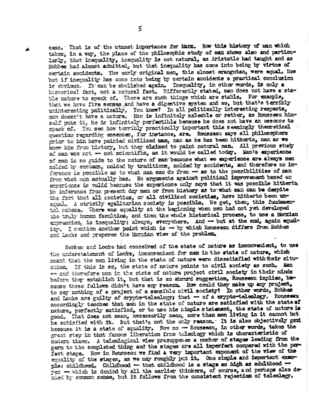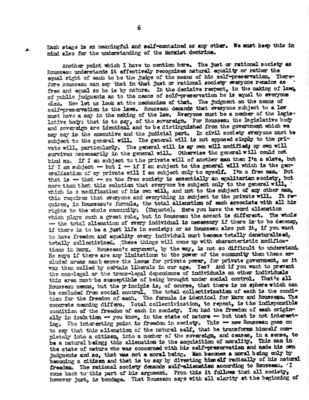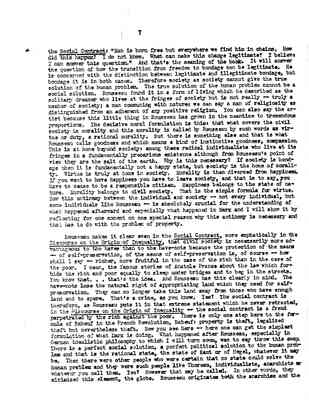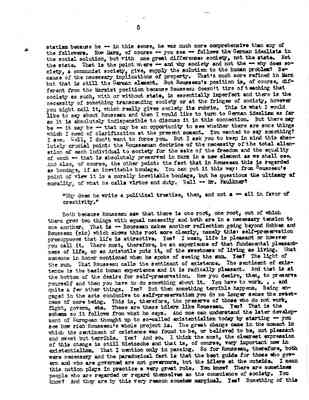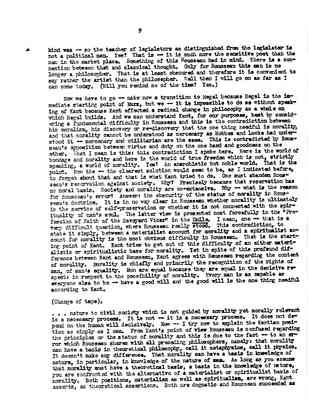Pages
6
cess. That i of the utmost importance for Marx. Now this history of man which takes. in a way. the place of the philosophic study of man shows also and particularly. thatinequality. inequality is not natural. as Aristotle had taught and as Hobbes had almost admitted. but that inequality has come into being by virtue of certain accidoriginal men. thi almost orangutn. were equal. Now but if inequality has come into being by certain accidents a practical conclusion is obvious. It can be abolished again. Inequality. in other words. is only a historical fact. not a natural fact. Differently stated. man does nothave a stable nature to speak of. there are such things which are stable. For example. that we have five senses and have a digestive system and so. but that's terribly uninteresting politically. You know? In all politically interesting respects. man doesn.t have a nature. Man is infinitely maleable or rather. as Rousseau himself puts it. he is infinitely perfectible because he does not have an essence to speak of. You see how terribly practically importan this seemingly theoretical question regarding essences. for instnce. are. Rousseau says all philosophers prior to him have painted civilized man. man as he has been hitherto. man as we know him from history. but they claimed to paint natural man. Man.s experience molded by customs. molded by traditions. molded by accidents. and therefore no inference is possible as to what man can do from - as to the possibilities of man from what man actually has. No arguments against political improvement based on experience is valid because the experiece only says that it was possible hitherto. No inference from present day man or from history as to what man can be despite the fact that all societies. or all civilized societies. have hitherto been unequal. A strictly egalitarian societyis possible. We get. then. this fundamental scheme. There was equality at the beginning when men had not yet developed the truly human faculties. and then the whole historical process. to use a Marxian expression. is inequality: always. everywhere. And - but at the end. again equality. I mention another point which is - by which Rousseau differs from Hobbes and Locke and prepares the Marxian view of the problem.
Hobbes and Locke had conceived of the state of nature as inconvenient. to use the understatment of Locke. inconvenient for man in the state of nature. which meant that the men living in the state of nature were dissatisfied with their situation. If this is so. the state of nature points to civil society as such. Man- and therefore men in the state of nature project civil society in their minds before they establish it. but that is an absurd suggestion. Rousseau implies. because these fellows didn't have any reason. How could they make up any project. to say nothing of a project of a sensible civil society? In other words. Hobbes and Locke are guilty of crypto-teleology: that - of a crypto-teleology. Rousseau accordingly teaches that men in the state of nature are satisfied with the state of nature. perfectly satisifed.or to use his simple statement. the state of nature is good. That does not mean. necessarily mean. more than men living in it cannot but be satisfied with it. But that's not the only reason. It is also objectively good because it is a state of equality. Now no - Rousseau. in other words. takes the great step in that famous liberation from teleology which is characteristic of modern times. A teleological view presupposes a number of stages leading from the germ to the completed thing and the stages are all imperfect compared with the perfect stage. Now in Rousseau we find a very important exponent of the view of the equality of the stages. as we may roughly put it. One simple and important example: childhood. Childhood - that childhood is a stage as high as adulthood- yes - which is denied by all the earlier thinkers. of course. and perhaps also denied by common sense. but it follows from the consistent rejection of teleology.
7
Each stage is as meaningful and self-contained as any other. We must keep this in mind also for the understanding of the Maxist doctrine.
Another point which I have to mention here. The just or rational society as Rousseau understands it effectively recognizes natural equality or rather the equal right of each to be the judge of the means of his self-preservation. Therefore Rousseau can say that in that just o rational society evereyone remains as free and equal as he is by nature. In the decisive respect. in making of law. of public judgments as to the means of self-preservation he is equal to everyone else. Now let us look at the mechanism of that. The judgment on the means of self-preservation is the laws. Rousseau demands that everyone subject to a law must have a say in the making of the law. Everyone must be a member of the legislative body: that is to say. of the sovereign. For Rousseau the legislative body and sovereign are identical and to be distinguished from the government which we may say is the executive and the judicial part. In civil society everyone must be subject to the general will. The general will is not opposed simply to the private will. particularly. The general will is my own will modified: my owe will survives necessarily in the general will. Otherwise the general will could not bind me. If I am subject to the private will of another man then I'm a slave. but if I am subject -but I - if I am subject to the general will which is the generalization of my private will I am subject only to myself. I.m a free man. But that - is - that so- the free society is essentially an egalitarian society. but more than that this solution that everyone be subject only to the general will. which is a modificaton of his own will. and not to the subject of any other man. this rquires that everyone and everything is subject to the private will. It requires. in Rousseau.s formula. the total alienation of each associate with all his rights to the whole community: (Unquote). Here you have the word alienation which plays such a great role. but in Rosseau the accent is different. The whole - - total alienation of every individual is necessary if there is to be decency. if there is to be a just life in society: or as Rousseau is also put it. if you want to hav freedom and quality every individual must become totally denaturalized. totally collectivised. These things will come up with characteristic modifications in Marx. Rousseau.s argument. by the way. is not so difficult to understand. ie says if there are any limitations to the power. for private government. as it was then called by certain liberals in our age. Yes? And if you want to prevent the non-legal or the trans-legal dependence of individuals on other individuals this area must be susceptible of being brought under social control. That.s all Rousseau means. but the principle is. of course. that there is not sphere which can be excluded from social control. The total collectivization of each is the condition for the freedom of each. The fomula is identical for Marx and Rousseau. The concrete meaning differs. Total Collectivization. to repeat. is the indispensable condition of the freedom of each in society. You had the freedom of each originally in isolation - you know. in the state of nature- but that is not interesting. The interesting point is freedom in society. This - now Rousseau goes on to say that this alienation of the natural self . that he transforms himself-completely into a citizen. into a member of the sovereign. and ceases. in a sense. to be a natural being: this alienation is the acquisition of morality. This man in the state of nature who was concerned with his self-preservation and made his own judgments and so. that was not a moral being. Man becomes a moral being only by becoming a citizen and that is to say by divesting himself radically of his natura freedom. The rational society demands self-alienation according to Rousseau. I come back to this part of his argument. From this it follows that all society. however just. is bondage. That Rousseau says with all clarity at the beginning of
8
This page is not transcribed, please help transcribe this page
9
This page is not transcribed, please help transcribe this page
10
This page is not transcribed, please help transcribe this page
